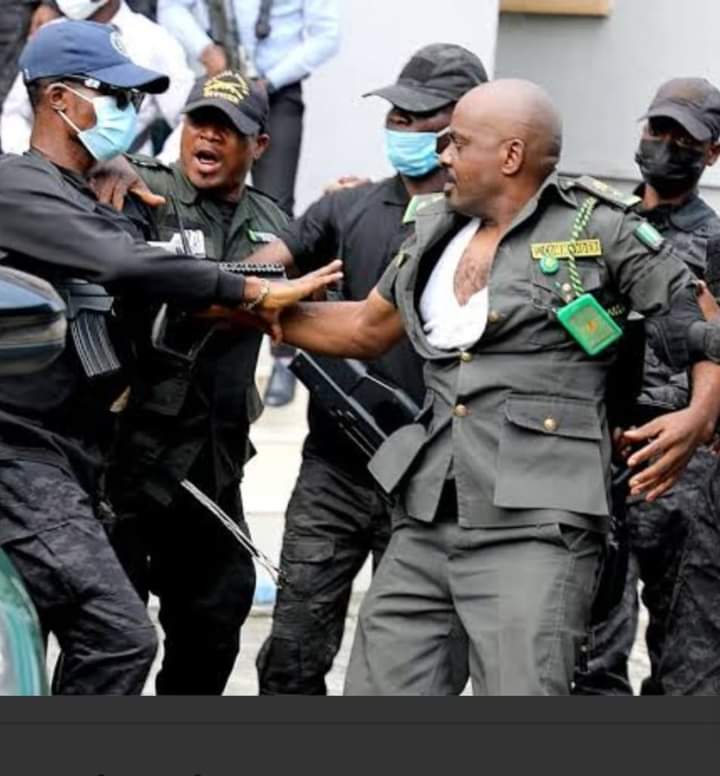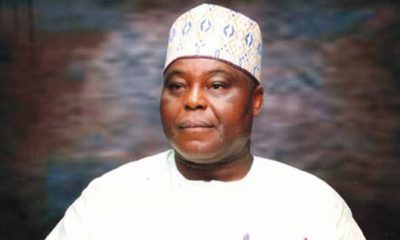News
Have you read “The secret behind DSS, Prisons Service officials fight over Emefiele?”

By Emeka Ugwuonye
One of the good things out of spending time in Nigerian prison was that I learnt some secrets about how the prison and the Nigerian criminal justice system work. Yes, I was detained in Kuje prison. I was never convicted. No court ever found me guilty of any crime. And I did not commit a crime. Yet, I spent time in prison. I used my time in prison to study the prison and the system so well. If Nigerian prison were to be a university, I would have gotten double PhDs. In Nigerian, nobody goes to prison just because he committed a crime. You go to prison because you annoyed someone who has money to pay someone for you to be charged.
Now, about the fight you read about between DSS and prison officers, there are questions to ask. First, why was the Officer-in-Charge of Ikoyi Prison in court at that time? The Officer-in-Charge is the equivalent of Deputy Commissioner of Police. He does not go to court unless ordered to appear. The Officer-in-Charge of the correctional center does not normally go to court But this Officer-in-Charge was in court as Emefiele was ordered to be remanded in Ikoyi Prison. Why?
The prison staff, especially the Officer-in-Charge and above make a lot of money when a big man is detained in their prison. They go out of their way to curry favor from such big men. A man like Emefiele has a lot of money. He will need a lot of favors while in prison. He will need access to phones. He will want to have air-conditioned cell, specially fitted cell. He will want to have access to visitors and many other things. He is not entitled to any of this. But with the support of the Officer-in-Charge, he will have them and more. That will cost him a lot of money, like millions of money. So, everybody in the prison hierarchy would have been lined up to benefit from Emefiele. That effort starts right from the moment he leaves the court and heads to prison. He would be taken in special vehicle.
I saw this a few times in Kuje. I will never forget the day Abdulrasheed Maina arrived in Kuje prison. All the top officials went wild. They were falling over themselves in order to please Maina. I happened to be taken to the court the same day Maina was being taken to court for the first time from the prison, and they placed me in the same van with Maina. Oh my God! It was like the President’s motorcade. The entire prison top guys went to court that day in support of Maina. There were sirens and escort vehicles ahead of our van. They said they were providing security. I was laughing silently as I watched all the prison officers falling over themselves to please Maina. So, I could imagine what was going on in their camp when they guessed that Emefiele was to be arraigned in court for firearm-related offences. They knew that the court would grant Emefiele bail and that he would likely not meet the terms of bail the same day. So, he would spend at least one night in prison.
Again, I have double PhD on the Nigerian criminal justice system. I saw a part of it that lawyers do not see and which is never taught in any law school. The prison officers are at the bottom of the food chain. By the time an inmate gets to the prison, the police have taken all his money. He has paid his lawyer and may have bribed the court officials. By the time he finally gets to the prison, he is out of money. So, the prison officers do not have the opportunity to make money from their inmates as the police do from suspects. Compared to other players in the chain, prison officers are the poorest. So, they could be quite desperate and when opportunities like Emefiele comes, they grab them with both hands. They could go out of their way to please such a man, as you saw in the free-for-all fight between DSS and prison officers. Thank God they didn’t shoot themselves
Back to Maina’s case, Maina is quite a character. The first day he was taken to court from the prison and I went in the same van. By the way, all the time that I had been going to court from prison, they would put me in some rickety and dilapidated iron monger, a sort of gwongworo. The ride to court was so agonizing because the poorly constructed contraption they call vehicle was dangerous for even inmates to travel in them. But that day I went in the same van with Maina, the prison authority suddenly brought a van with air-conditioner in it. Immediately I saw Maina in the van, I chatted him up. We became friends there and then. He is an American citizen (I am sure many people did not know that). And knowing I was from America, Maina became close to me. But I knew instantly that associating with Maina could be tricky. He is a funny character.
That first day, the Officer-in-Charge went to court. He ordered even the prison doctor to go to court. The prison officials took a hospital bed and stretcher to court so that when we got to court Maina would pretend to be sick and they would wheel him in. This was calculated to increase the chances that the judge would grant him bail on health ground. I was laughing. Maina was okay when we left the prison, but he was suddenly sick by the time we got to the court. All that trick was organized by the prison officials to help the big man.
Nigerian justice system is so weird that sometimes you don’t know who to blame. Various agencies don’t trust each other. DSS does not trust the court. They believe that the judge might take bribe and compromise the case. That is why sometimes, the police, the DSS, the EFCC are reluctant to take suspects to court. They don’t trust that the judge would act without influence. But at the same time, DSS is not any better than the court. The DSS people knew that if Emefiele was allowed to go to Ikoyi Prison, he would have access to phones and would have visitors and he would probably obstruct any further investigation. DSS could not trust the court and could not trust the prison with Emefiele.
In fact, DSS only charged Emefiele because the court ordered them to charge him or release him. To frustrate the court, the DSS obtained a warrant of arrest on another offense from another court to justify their continued detention of Emefiele. They kept the warrant in their back pocket, knowing that the court would order Emefiele detained at the prisons. So, DSS took Emefiele to court but with weapons they planned to use to frustrate whatever the court ruled. That is the danger in this country. None of these agencies is acting honestly. Each has its own agenda depending on who heads it, and each is suspecting other agencies. The EFCC does not trust the police, the court, DSS or the prisons or anybody outside EFCC. DSS does not trust the court, the police, EFCC, the prisons. In an ideal setting, each of these agencies is supposed to trust the sister agencies. The only institution that should not trust anyone is the court. But surprisingly, our courts trust the police, the EFCC and DSS. And that is why the courts fail the citizens. The constitution designed it in such a way for the courts to be suspicious of these agencies and to protect citizens against them. But are courts are timid and they trust the people they supposed to be skeptical about.
I was not surprised to see that the distrust between these agencies (that are supposed to be coordinated and cooperating) would get to the point of DSS manhandling the Officer-in-Charge of the prison. Thought embarrassing for the country, it was also funny. Why would the Officer-in-Charge get so personally involved to the point of being beaten up and bundled into the DSS van. It was as if DSS were going to detain him and Emefiele. Why didn’t he just contact his boss who would contact the boss of DSS and possibly the president? Why fight like school children? That was because they were all fighting for their pockets
On many occasions, the police refuse to take suspects to prison as ordered by court, the police actually run their own illegal prisons. Why didn’t the Officer-in-Charge go to fight the police for the poor guys they abuse all the time? No, the poor guys have no money to give the prison officers. Only the Emefieles of this country would cause such a fight.
Just know one thing: all these people had their own agenda. The court knew this could happen. The court deliberately remanded him in prison. It was not a coincidence. The Officer-in-Charge of prison, instead of doing his work, personally came to the court to receive Emefiele. The DSS knew that all that would happen and they came with another warrant in their pocket, which they obtained from another judge, who also knew the game. It is a funny country. I would have asked you to pray. But if all the prayers our parents have been praying since the days of Lord Lugard did not help, how will your prayer today make any difference?
Business
Tinubu assures of better business environment as Coca Cola announces $1billion investment in Nigeria

President Bola Tinubu has reiterated his administration’s commitment to creating a robust financial system and a business-friendly economy that will attract more foreign direct investments.

The President made the commitment on Thursday in Abuja, as the Coca-Cola Company announced plans to invest $1 billion in Nigeria over the next five years.
According to a statement by Chief Bayo Onanuga, Special Adviser to the President on Information and Strategy, the announcement was made at a meeting between the President and the global leadership team of Coca-Cola Company, led by Mr John Murphy, its president and chief financial officer, and the Chairman of Nigerian Bottling Company, Ambassador Segun Apata.
The statement which Nationwide Reports obtained Thursday, added that President Tinubu commended Coca-Cola for its long-standing partnership with Nigeria and for promoting investment opportunities that have employed over 3000 people across nine production facilities.
”We are business-friendly, and as I said at my inauguration, we must create an environment of easy-in and easy-out for businesses.
”We are building a financial system where you can invest, re-invest, and repatriate all your dividends. I have a firm belief in that,” he said.
President Tinubu told the delegation that private sector partnerships, which sustain investments, are central to his government’s far-reaching reforms to improve the business environment.
He pledged that the government would continue partnering with Coca-Cola to expand investments in Nigeria and address environmental issues, including climate change.
”The size of this country is enormous in Africa, and the consumption capacity of Nigeria is expanding daily,” President Tinubu added while commending the company for scaling up its skill development and community initiatives as part of its corporate social responsibility.
Presenting an overview of Coca-Cola’s business in Nigeria, Murphy noted that the company generates N320 billion annually through nearly 300,000 customers and contributes almost N90 billion in revenue to the Nigerian government.
”We are very proud of the growth of the business over a long period and its impact on the daily lives of many Nigerians.
”Beyond the financial impacts, we are also very committed to supporting the communities, and over the last number of years, we’ve had a special focus on several areas in the world of sustainability, water packaging and others, ” he said.
Mr Zoran Bogdanovic, CEO of Coca-Cola Hellenic Bottling Company, explained that the company’s confidence in Nigerian government policies had encouraged it to make the $1 billion investment pledge.
”Mr President, in your inaugural address, we were very pleased to hear of your invitation for foreign investors to invest and your assurance that foreign businesses can repatriate dividends and profits.
”That assurance gives us the confidence to continue our investments. Since 2013, we have invested $ 1.5 billion in Nigeria in capacity expansion, transformation of our supply chain infrastructure capabilities, training and development.
”I am very pleased to announce that, with a predictable and enabling environment in place, we plan to invest an additional $1 billion over the next five years.
”We believe Nigeria’s potential is tremendous, and we are committed to working with the government to realise this potential,” he said.
News
NSITF wants Employees Compenstion Scheme for all casual construction workers

The Nigeria Social Insurance Trust Fund, NSITF has called for a joint taskforce with the Federation of Construction Industry (FOCI) to ensure that all casual workers in the sector are covered by the Employees Compensation Scheme (ECS).
Delivering keynote address at the 68th Annual General Meeting of the Federation today in Abuja, the Managing Director of the NSITF, Oluwaseun Faleye frowned at the situation where thousands of casual workers in the construction industry are left outside the coverage of the ECS with the attendant consequence of abandonment in the event of workplace accidents or death. He described it as a dire anti-worker situation, which poses a huge risk to the foundation of safety in the world of work.
He said, “I want to bring your attention to an issue that requires our immediate and collective action, and that is the coverage of casual workers under the ECS.
“Currently, our practice ensures that contract staff are covered by the ECS. But what about our casual workers? These individuals face the same risks, breathe the same dust, and contribute equally to the progress of our projects. Yet, they stand outside the protective umbrella of our scheme. This disparity is not just unfair; it’s a risk to the very foundations of safety we’re trying to build.
“I therefore call for change. The NSITF is open to finding solutions, but we need your help, your expertise, and your commitment. We want FOCI to partner with us in developing strategies to ensure that all construction workers – regardless of their employment status – are adequately covered by the ECS.
“This is not just about compliance; it’s about values. It’s about recognizing the worth and dignity of every individual who contributes to building our nation. It’s about living up to the ideals that we, as industry leaders, profess to uphold.
“I propose that we form a joint task force between NSITF and FOCI to tackle this issue head-on. Let’s explore innovative solutions – perhaps a flexible premium structure or a pooled resource model. Our management team is ready to sit down with you, to listen, to brainstorm, and to implement practical solutions that work for everyone.”
In a statement Thursday, Nwachukwu Godson, General Manager, Corporate Affairs, quoted Faleye to have stated that steps must be taken to protect the dignity and safety of every individual worker as a pivotal requirement in building a resilient national workforce. Faleye also described the ECS as a safety net and springboard, fostering a culture of workplace responsibility while encouraging best practices in occupational health.
He further charged all construction companies to improve the safety and health standards of their workers, saying that the unenviable record of preventable workplace accidents in the sector cannot be ignored.
“The construction sector, along with manufacturing, has historically held an unenviable record of preventable work accidents in Nigeria. This is a stark reality we can no longer ignore. Our records at NSITF show that a disproportionate number of our interventions for accident victims and work-related fatalities come from these sectors.”
He therefore urged the sector to apply cutting-edge factors that influence the dynamics of safety and health in their operations.
Meanwhile, the NSITF has reiterated its commitment to strengthening collaboration with the Nigeria Employers’ Consultative Association (NECA).
The Managing Director, Oluwaseun Faleye, stated this during a courtesy visit by the Director General of NECA, Mr. Adewale Smart Oyerinde, at the headquarters of the Fund , Wednesday.
Mr. Faleye pledged to expand all ongoing initiatives, including the flagship Safe Work Intervention Project, which aims to reward best safety practices and improve workplace safety across Nigeria.
He noted that stronger ties between the two institutions are critical in advancing labour relations and social security for Nigerian workers.
He further acknowledged the pivotal role of NECA as a tripartite partner in the management board of the NSITF, noting that the symbiotic relationship between the two institutions has been pivotal in promoting workplace safety as a basic factor in optimizing national productivity, further commending NECA for providing stability to the national economy.
“I applaud NECA’s consistency in pushing the cause of employers especially on issues relating to inflation, interest rate and the high energy cost and other issues key to the employers. We appreciate this because, for us as much as we are interested in the social safety net that we provide from our mandate, we also need businesses to thrive; we need businesses to be alive to employ. It’s in that process that we are also able to execute our mandate.”
Mr. Oyerinde, in his response, commended NSITF’s leadership under Mr. Faleye, noting that NECA’s partnership with the Fund is vital for ensuring sustainable employment relations.
“We will continue to engage, but I wish to first congratulate you on this important appointment. This is a very big time in the life of all of us, in the life of businesses and the survival of the fund as it were. We are fully committed to working with the NSITF to make sure that every worker in Nigeria has access to a safe and secure work environment,” he said.
He also reaffirmed NECA’s dedication to supporting the Fund’s initiatives aimed at reducing workplace risks, enhancing employer compliance, and improved safety standards.
News
Zamfara Gov Dauda Lawal accuses predecessor Matawalle of complicity in banditry, fund mismanagement

The Governor of Zamfara State, Dauda Lawal, has alleged that his predecessor, Bello Matawalle, was fully involved in banditry issues plaguing the state.
He made the allegation while speaking on a TVC politics programme on Wednesday night and claimed that, based on information at his disposal, his predecessor led a government that was complicit with bandits.
Lawal also accused the previous administration, headed by Bello who is now the Minister of State for Defence, of misappropriating state funds and handling insecurity with leniency.
“Yes, there were a lot of issues in the past with my predecessor. In fact, let me state this very categorically: if I were him (Matawalle), I would resign and face all the allegations against me, which would have been more honourable. From all the information we are receiving, my predecessor (Matawalle) was fully involved in some of these banditry issues,” Lawal stated.
Justifying his claim that his predecessor was implicated in the banditry, he recounted how a permanent secretary under Matawalle’s administration paid ransom through the Government House to secure the release of his children, who had been abducted by bandits.
The governor said, “A typical example is the permanent secretary whose children were abducted, and it was unfortunate that he had to pay ransom through the Government House. It was also very clear, based on all the allegations, that bandits were being sheltered at the Government House. And there were many other issues.”
He added that, if he were Matawalle, he would have resigned to clear his name of all allegations.
“So, for me, honestly, if I were him, I would step aside and face these allegations until my name is cleared, before returning to continue my job. How can you imagine such allegations against him, and yet he remains the Minister of Defence? I mean, that is unfair. This man could have been honourable, stepped aside, faced the allegations, cleared his name, and then come back to continue his job,” Lawal stated.
He added that his predecessor’s file was before the Economic and Financial Crimes Commission and expressed surprise that the same person had been cleared by lawmakers and security agencies for the post of minister.
“In May 2023, there was an allegation of misappropriating over ₦70 billion, and when we took over, we realised that ₦70 billion was a small fraction compared to the rot on the ground. All this information was before the EFCC, and I wondered how this man was cleared by the security agencies before being confirmed as a minister. If I were him, I would face the EFCC and say, ‘Look, let me clear my name.’
“This is a man with 41 children, and for goodness’ sake, what kind of legacy is he going to leave for his children when he is being accused of misappropriating such a large sum? He should have come forward, faced the EFCC, and cleared his name.
“But we are still waiting to hear from the EFCC, and the case has been ongoing for over a year now. Meanwhile, this is the people’s money we are talking about. We need this money in Zamfara with all the challenges we are facing, including financial constraints. At the very least, let’s recover some of this money for Zamfara so that we can work for the people of the state,” Lawal concluded.
-

 News1 year ago
News1 year agoBreaking: Tinubu’s authentic ministerial nominees
-

 News1 year ago
News1 year ago“Anytime we want to kill terrorists, President would ask us to take permission from France but they were killing our soldiers-” Niger Republic coup leader
-

 News11 months ago
News11 months ago“I’m leaving the Catholic church because Bishop Onah is oppressing me,” says Okunerere
-

 News1 year ago
News1 year agoDokpesi and the Gazebo Mystique
-

 News1 year ago
News1 year agoRadio Nigeria’s veteran broadcaster Kelvin Ugwu dies three months after retirement from service
-

 News5 months ago
News5 months agoPersons against Allagoa’s reforms behind protests at NSITF
-

 News1 year ago
News1 year agoTsunami: Tinubu orders dissolution of managements, boards of MDAs, to sack all Buhari’s political appointees
-

 News1 year ago
News1 year agoLast minutes fever: Nigerian Hunters Service optimistic as Buhari signs five Bills into law

